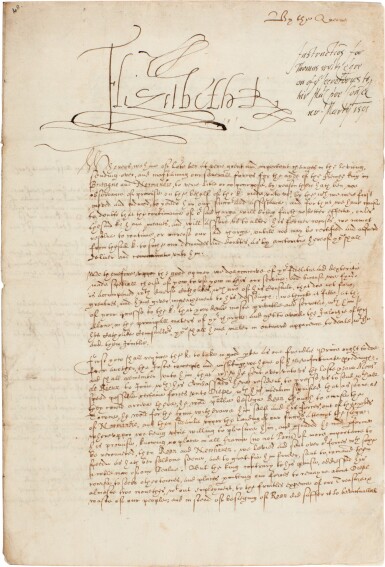
Queen Elizabeth I | Letter signed, explaining her priorities in war-torn France to her new envoy to Henri IV, 1592
Lot Closed
April 13, 01:38 PM GMT
Estimate
20,000 - 30,000 GBP
Lot Details
Description
Queen Elizabeth I
Letter signed boldly at head ("Elizabeth R), to Thomas Wilkes, Clerk of the Privy Council and envoy to Henri of Navarre
providing detailed diplomatic instructions, emphasising that her greatest priority remains that her enemies should never become "an owner of one foote of grounde in Englande", expressing her frustration at the French King's policies and military strategy, and threatening to withdraw the military aid she has afforded the King to assist him in Brittany and Normandy unless he "alter his former courses", signed at the end by Burghley and with an autograph note by him at the head of the first page ("Instructions for Thomas Wylkes Esquire on[e] of ye secretaries to Hir Ma[jes]tes P[ri]ve Cou[n]sell xv Martii 1591"), docketed on final blank, five pages, folio, 16 March 1592, damage at outer corners and at central fold with some minor loss of text professionally repaired
A GLIMPSE OF QUEEN ELIZABETH'S THINKING ON FOREIGN POLICY AS SHE INSTRUCTS HER ENVOY TO HENRI IV, WHO WAS THEN FIGHTING A CIVIL WAR TO GAIN THE THRONE. She explains to Wilkes that her support of Henri has come at great cost, but this was "to verie little or no pourpose" because he has failed to keep to his promises and engagements. Furthermore, Henri is "accompanied wth diverse Catholikes" in his Council, that so Wilkes must "deale moste privatlie and secretlie" with the King himself in the principal matters of his business "and yet to avoide the Jalouzie of those his Catholike Counsaillo[ur]s" he should have "mater in outward apparence to deale wth him and them jointlie".
She instructs Wilkes to express to Henri her serious concerns about his policies in northern France. Firstly, he has not paid proper attention to the siege of Rouen, even though she knows "no place in all france (no not Paris) of more importance to be recouvered". The Spanish allies of the Henri's enemy, the Catholic League, have reinforced the garrison in Rouen whilst English forces have spent "almoste two monethes, without employment, to the fruitles expence of our Treasorie & waste of our people." If Rouen cannot be retaken then she will withdraw her forces. She also suspects that Henri has not provided sufficient support for Brittany, where the Spanish are also active, because he has been advised that she will then be forced do the job for him. This provokes a masterly retort:
"…therein yow may advise the K. from us, not to be fedde with soche an error of lacke of wisdom in us, that we will adventure the strength of our owne Realme, to defend the Contrey of another king. Therefore, if the K. shall not effectually resolve and determine to increase his forces . . . we will absolutlie (notwthstanding all imaginacons) revoke our said forces and dow not doubt (what succes so ever the K. of Spaigne shall have in Britagnie) but to provide by Godes grace in soche sorte for the defence of Englande, and other our Dominions, as the gayning of Britaigne shall not make the Spagnarde an owner of one foote of grounde in Englande..."
The price of her continued aid is that her forces be provided with a port, preferably Brest. She provides arguments in favour of this for the French King to use with his own councillors. She also suggests a subterfuge whereby at the one time the jealousy of the Catholic councillors can be allayed and their real intentions be drawn out.
AN EXCEPTIONAL LETTER THAT SHOWS BOTH ELIZABETH'S COMMAND OF A COMPLEX WEB OF FOREIGN POLICY, AND HER PRIORITY THAT HER FOREIGN ENEMIES SHOULD NEVER BECOME "OWNER OF ONE FOOTE OF GROUNDE IN ENGLANDE".
PROVENANCE:
Sotheby's, London, 15 December 1980, lot 82
You May Also Like

